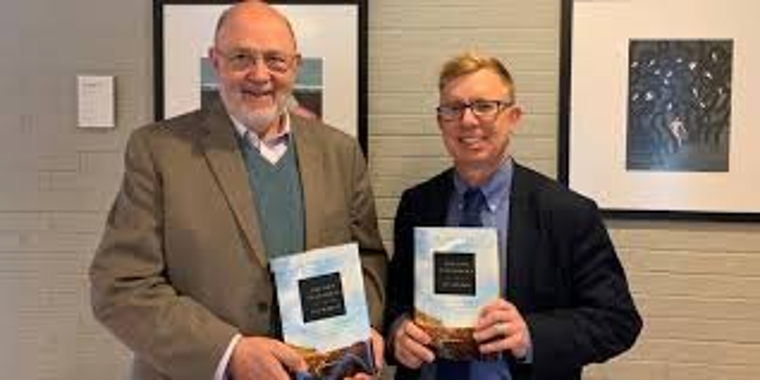THE BOOK THAT I SHALL NEVER READ: The New Testament in Its World
The New Testament in Its World Workbook: An Introduction to the History, Literature, and Theology of the First Christian by Nicholas Thomas Wright & Michael Bird
By Roger Salter
Special to Virtueonline
www.virtueonline.org
September 18, 2020
For this person, the Bishop's Blockbuster has not the slightest appeal. Background information concerning the New Testament only has "saving value" if it is clearly in support of the New Testament Gospel. Apart from this the acquisition of historical and cultural knowledge is a time-consuming and futile pursuit.
Background knowledge, as advantageous as it may be under right circumstances, will not deliver the soul of sinful man, though it might fascinate the human mind, and swell the sense of superiority of readers over the common laity. If the principal author errs in that most vital area of justification by faith alone, and the nature of the atonement, the above volume will merely load the human brain with heavy verbiage and lighten the wallet of hard-earned cash.
Holy Scripture carries the message of divine redemption quite adequately and accurately on its own. It is sufficient for the communication of a complete salvation. The simplicity of the "way of salvation" is its cardinal quality as to its comprehension and magnificent charm. The Old Testament lays the basis for the Gospel and the New Testament explicates the welcome message to the full.
The cultural contexts of the various documents that comprise the Bible are of great assistance to our appreciation of the Word of God only when the Word is gratefully received in faith and humility. If the facts of historical events and cultural features are taught by those who dispute the teaching of Holy Writ in its primary assertions the scholarship, however elegant and exhaustive, is greatly diminished in its usefulness and spiritual benefit, and many, more modest publications than the above, abound for the education of sincere believers.
No culture at any time determines the content of the Gospel. We cannot be sure, even, of which strands of culture had any determining affect/effect upon the writers of Scripture, and in what sense they regarded and interpreted contemporary philosophy, literature and ideology, or what nature of nuance they employed from any vocabulary available to them.
N. T. Wright has already stolen the heart and essence of the gospel from those eagerly enquiring about it (Justification and Atonement). Atonement and justification are the keys to the kingdom and N.T. Wright has cast them away.
N.T. Wright's claim for his specialist expertise as being necessary for our accurate comprehension of the Bible's message has already stolen the Scriptures from those seeking to know the Word of God. The people of God must now rely upon a new priestly caste of professional scholars who alone are wise to the secrets of divine revelation and capable of conveying them to us.
N.T. Wright shadows the lines of Scripture with his proud, emphatically pedagogic "second digit" (it wags), repeating necessary terms as and because they arise, but distorting the meaning at many significant points.
N.T. Wright has promoted first century Gentile thought above the authority of the Old Testament. "The Scripture is that wherewith God draws us unto him. The Scriptures sprang out of God (expectation), and flow unto Christ (fulfillment), and were given to lead us to Christ (completion). Thou must therefore go along by the Scriptures as by a line, until thou come at Christ, which is thy way's end and resting-place." Scripture is sufficient in its role of conducting us safely to the Lord Jesus. --- William Tyndale
N.T. Wright has greatly reduced the personal spiritual intensity of intimacy with our Savior God to be enjoyed fully by the children of God as they trace the mystery of saving grace extended toward them individually through the eternal and infinite love of the Lord. (1 John 1: 1-4).
If most of us did not unduly defer to fame, success, and opaque scholarship we would have to concede that N.T. Wright is not a safe guide to eternal salvation and there has to be the issue of his intellectual resources which, sadly and inevitably, compromise our way to life in and with God.
This latest hefty tome is not the treasure it purports to be in all the recent hype. We hope its publishers, in the interests of the environment, printed it entirely on recycled paper, possibly reclaimed from previous NTW publications. However, its weight and dimensions would qualify it to serve as a handy doorstop, or even more suitably as a means of keeping a stout cathedral door ajar for the convenience of guests who may wish to enter the building.
With chirpy Michael F. Bird as his co-contributor it may be wondered if antipodean Anglican Reformational theology is about to crumble.
The Rev. Roger Salter is an ordained Church of England minister where he had parishes in the dioceses of Bristol and Portsmouth before coming to Birmingham, Alabama to serve as Rector of St. Matthew's Anglican Church. He is a frequent contributor to Virtueonline.
END














